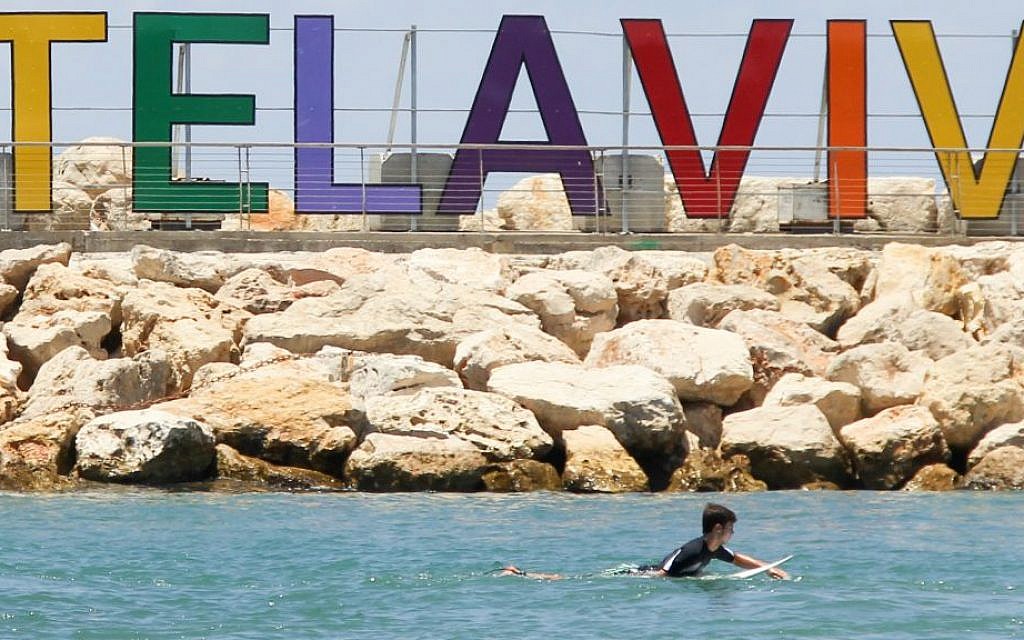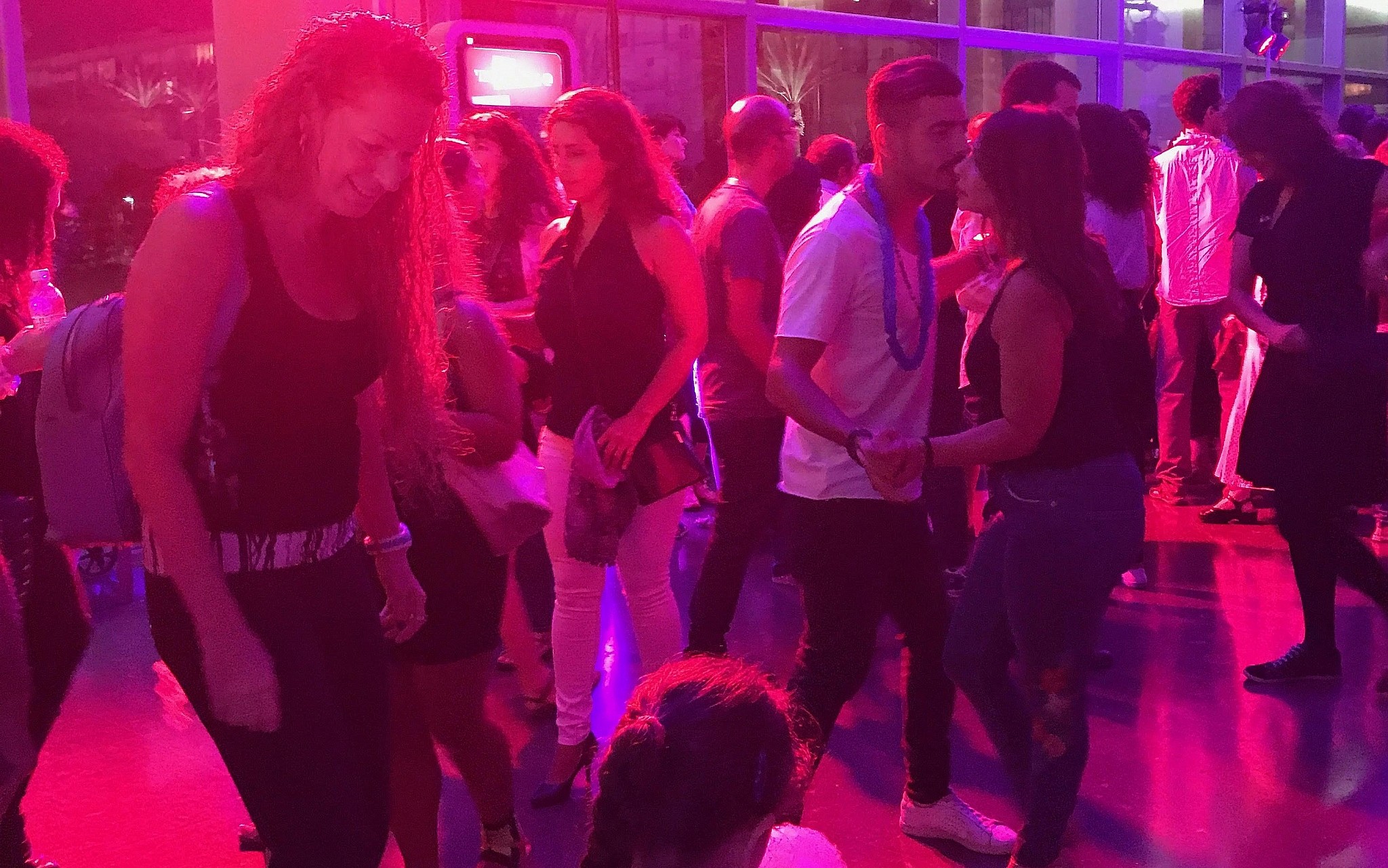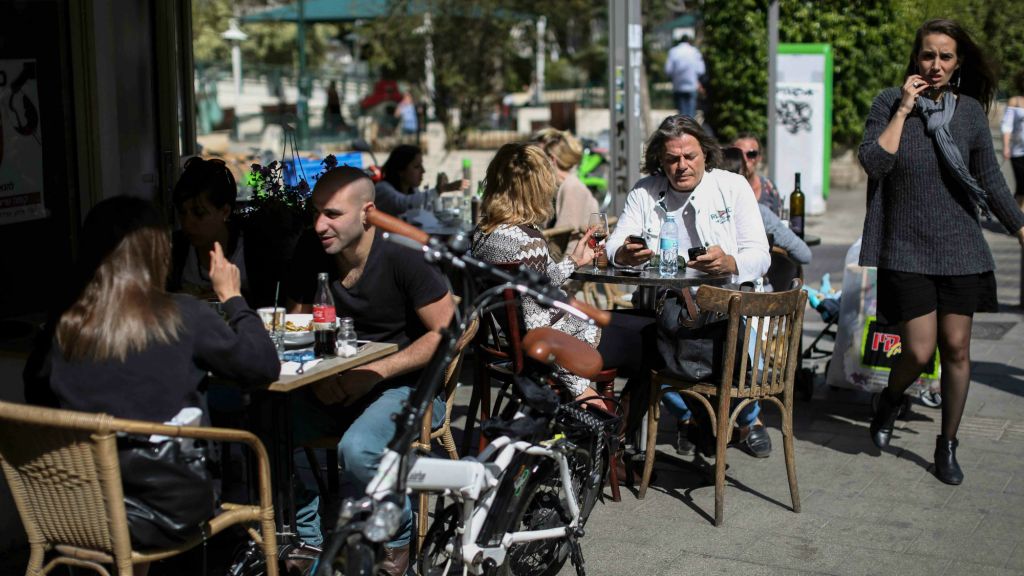The white city toasts new arrivals with a month of events, but activists say that won’t be enough to keep them here

Couples twirled around the room, kicking up their feet as a salsa band played, the Spanish lyrics ringing out in Tel Aviv’s vast Municipality Building. Adults smiled, as children ran around and enjoyed big cotton candy beehives.
The festive event on Monday evening kicked off the Aliyah Month of Celebrations, organized by the “Olim in Tel Aviv” group, the municipality’s attempt to support new immigrants assimilating into the city.
This year is the first time the municipality is celebrating Aliyah Day, in cooperation with the Ministry of Aliyah and Immigrant Absorption. The Knesset also marked Aliyah Day on Monday, while schools in Israel will observe the national holiday on Friday.
The municipality’s month of events was designed to introduce young people who are in the process of making aliyah to Tel Aviv, and convince them to settle there. The city is making an effort to capitalize on its standing as the cultural and business capital of Israel.

“We see ourselves as a global city, and we started this event to make our newer residents to feel at home,” said Jill Reinach, director of Projects for English Speaking Olim Residents for the Tel Aviv-Yafo Municipality.
The month of events will include poetry readings in French, a Shabbat meal with Spanish and Portuguese speakers, and stand-up comedy in Russian. But other career-building events, such as “How to Hack the Israeli Culture,” and another, even more basic, “Succeeding in the Israeli Workplace,” illustrate the biggest challenges for immigrants may lie in getting and keeping a job.
Tel Aviv has been called the “new aliyah capital,” by researchers who documented how Jews from Western countries overwhelmingly prefer cities. In 2016, Tel Aviv was the destination for 12 percent of new immigrants. The next three most popular cities were Jerusalem (10%), Netanya (9%) and Haifa (8%), according to the Ministry of Immigration. More than 3,000 immigrants moved to Tel Aviv in 2016, giving it the title of most popular destination for immigrants for the third year in a row.
Tel Aviv is a well-known start-up hub and home to a vibrant cultural atmosphere of beaches, bars and restaurants that often spurs those making aliyah to choose Tel Aviv. In addition to 14 kilometers (8.5 miles) of beaches, the city also has 1,748 cafes, bars and nightclubs — that’s one for every 230 residents — along with some 1,500 restaurants, according to municipality statistics.

Marcela Carilo, 38, made aliyah three years ago from Bogota, Colombia, to Haifa, but soon afterward she moved to Tel Aviv for her job as a civil engineer. “Tel Aviv’s a city, and I come from a city of 7 million,” said Carilo, who attended the salsa show with her sister and friend. “There’s restaurants and places everywhere. It’s pretty amazing. It’s almost 24/7.”
Tel Aviv is focusing on the positive, but the number of people making aliyah has declined overall within the past few decades. Immigration to Israel fell in 2016 after several years of growth, according to aliyah data from The Jewish Agency for Israel and the Ministry of Aliyah and Immigrant Absorption released in January. There was a 12% drop in immigration last year, with about 27,000 new immigrants arriving in 2016.
And retention is a key issue, too.
Israel’s high cost of living, expensive rental prices, and low salaries won’t prevent immigrants from leaving, according to research from the Taub Center for Social Policy Studies in Israel.
Though Tel Aviv has many work opportunities, the city also has the highest average prices of homes in Israel, according to the Central Bureau of Statistics.
But critics warn that turning up the salsa music isn’t enough to keep new immigrants dancing.
“Aliyah Month is bullshit, that’s how you’re spending the money?” said LiAmi Lawrence, who runs KeepOlim, a nonprofit he founded two years ago to encourage immigrants to stay in Israel for good.
“They are making promises to olim, there is no help finding jobs, and no mental help,” said Lawrence, who hails from California and initially started KeepOlim as a Facebook group to vent his own frustrations as an immigrant to Israel.
Lawrence said the top reasons for olim leaving are a lack of jobs, finances, loneliness, missing family, and language barriers.
“I’ve never argued for more benefits. Throwing more money at people ain’t going to solve the problem,” said Lawrence.
But he does think the government should be providing things like professional job-seeking advice and ongoing Hebrew language skills.
Experts agreed that the main obstacle for many immigrants is language. “Knowing Hebrew will help you find employment,” said Kyrill Shraberman, an employment market researcher with the Taub Center.
Shraberman said that high real estate prices compound the issues facing olim. Immigrants with a technical background are most likely to find work.

But Shraberman cautioned that every immigrant’s story is different, and it may take a few years to adjust to life in Israel.
“I think there should be a willingness to work hard for at least several years from coming to Israel, and try to be open-minded,” said Shraberman. “Experience in immigration is very personal, and it all depends on the circumstances.”
In the meantime, the city of Tel Aviv will hold its calendar of cultural events to keep the new immigrants in the city.
“We want people to feel at home. We want everyone to feel together, to feel as one,” said Reinach. “We want everyone to celebrate themselves, and to know as a city we care about them.”
As reported by The Times of Israel
